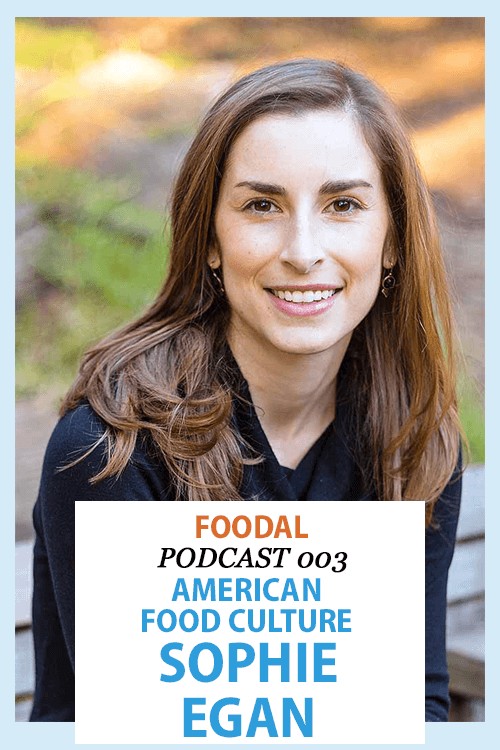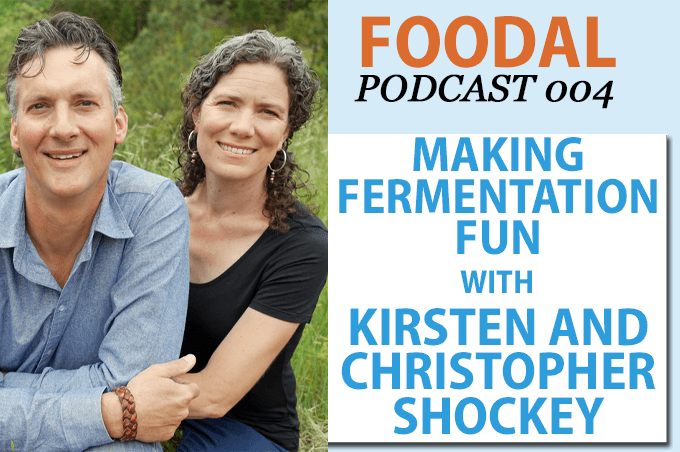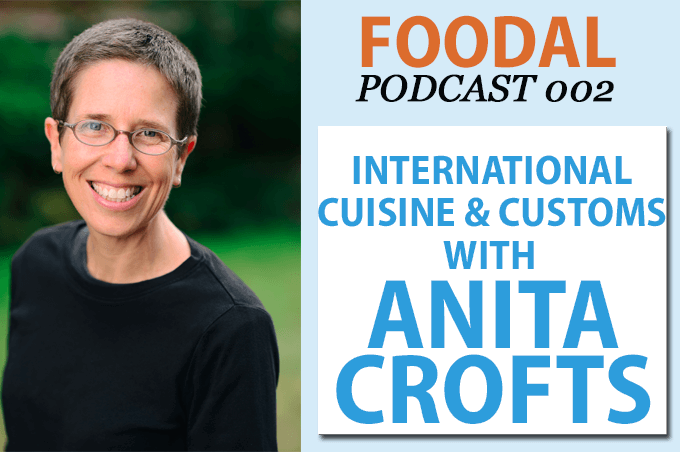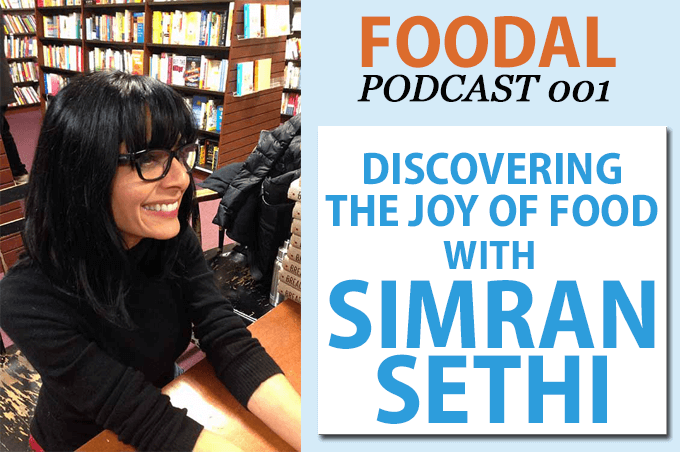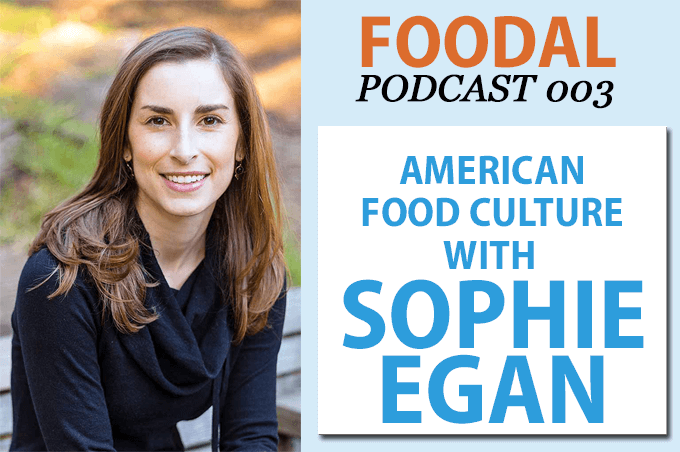
Want More Delicious Episodes? Subscribe to our Podcast!
If you’d like to receive every episode of the Foodal podcast on your favorite devices, subscribe with your preferred method below:
Shownotes
In this episode of the Foodal Podcast, managing editor Allison Sidhu catches up with Sophie Egan, author of the book “Devoured: From Chicken Wings to Kale Smoothies – How What We Eat Defines Who We Are.” Join us as they discuss:
- Super Bowl favorites, like chicken wings and pizza
- The effects of stress on our daily eating habits
- Our favorite childhood foods and the role of nostalgia
- Strategic food marketing, scarcity, and limited time offers
- The future of cooking and eating, in schools and beyond
Plus more on Sophie Egan’s work, her book, and what America’s food culture is really all about.
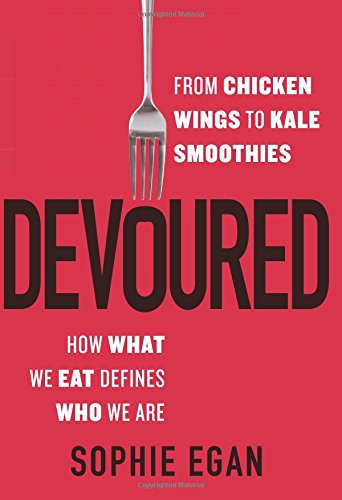
Devoured by Sophie Egan, available on Amazon.
Transcript:
Allison Sidhu: I’m speaking with Sophie Egan, author of the book Devoured: How What We Eat Defines Who We Are. Sophie is also a contributor to the Well blog on the New York Times website, and she was recently named to the University of California Global Food Initiative’s 30 Under 30 list, recognizing inspirational young people who make the food system more nutritious and sustainable. Sophie, welcome to the Foodal Podcast.
Sophie: Thanks so much for having me!
Allison: So, today I really want to focus on your book. I enjoyed it from the moment that I picked it up months back and I really wanted to share it with our listeners and our readers on Foodal. You cover so many different topics, but what the focus of your book really is in large part is looking at what the foods we eat say about who we are, and namely who we are in this food space as Americans. So, right off the bat I want to know more about the driving force behind this book. What inspired you to write it, and who should read it?
Sophie: Well thanks for the kind words. I’m glad you enjoyed it. You know, this book was a long time in the making. I really have been fascinated by the notion of a national food culture since I was ten years old and I was living in Italy actually on a farm with my family. And I observed these customs of my Italian friends and their families and started asking a lot of questions. My parents would describe, you know, the ways of the French and Japanese and so forth. And while I was pretty young at that age to be thinking about these topics, it really did stick with me.

And actually years later in college I studied abroad in Bologna, in the stomach of Italy, and I took a course there on the cultural history of gastronomy. And that was where this idea of a national food culture, really that phrase, came to really mean something. And you know, it’s the unwritten rules of the road, the way that people relate to food on a daily basis and their – really ways of daily life that are passed down from, you know, one generation to the next.
So, in any case, these experiences abroad gave me a lot of curiosity about what could be said about the United States. And I’ve read and worked very closely with Michael Pollan, and he and others have long questioned the idea that we have a national food culture. You know, there’s these ideas that we’re so diverse. For one, we’re a nation of immigrants, and just such a huge country, surely in terms of regional cuisine and geographical diversity. But also that we don’t have a culture that’s rooted in tradition. We are very forward looking as opposed to tradition and focused on replicating the customs of the past from one generation to the next. So, it’s this idea of like, well it’s always changing, and it’s so diverse, so how could you really put your finger on it? And I kind of liked that challenge!
So, I set out to define it. And I spent several years researching our food history as a country, and also talking to experts who kind of study eating behavior in the United States for a living. So, it was this quest to, you know, acknowledging our diversity as one of our absolutely greatest traits. But really, aiming to lift up, celebrate, but also help us reflect on the less positive ways that unite us as eaters in America.
Allison: Well, first of all – excellent job, because the story that you weave throughout the book is just, it’s exciting. It takes all different turns and goes down all different, you know, avenues that we can look at our food. But it’s also the kind of thing where I felt like there were so many stories that I then wanted to like share them with whoever I was having dinner with that night. Or, I would call my mom and be like, you know, I learned this thing about the history of spaghetti – it’s not the story that we’ve been told! So – [Laughter] I really think for a lot of people that’s the kind of thing where you get the bigger picture once you’ve read the whole thing. But it’s also just, there are so many fascinating food stories and you really touch on the diversity of that.
So, I really want to focus on the ideas of tradition and how we also do, like you said, come from so many different cultures, so many histories and food stories that come from all different places, and somehow we still manage to enjoy each other’s food. And, there are certain times of year – I’m sure you know what I’m getting at – where we sometimes bring them all together.
So, to lead into that, one thing I loved, Devoured offers extensive source notes and an excellent bibliography which, for those of you out there who are listening to the podcast, if you love a little reading assignment like I do, there is so much good stuff to dig into there if you want to know more. It’s like the perfect food lover’s syllabus. [Laughter] But along with those, you also include this great glossary. And there was one entry that immediately stood out to me while I was flipping through, which is “Cheesepocalypse.” And this is also the title of a chapter of your book that I’d really like to focus on. So, tell me a little bit about what you’re referring to there.
Sophie: Cheesepocalypse, yes, I wish I could take credit for penning this term. But actually, it was Kraft, Kraft Foods that came up with this. And they launched essentially a publicity campaign around what was actually a false shortage of Velveeta leading up to a Super Bowl a couple of years ago. And Cheesepocalypse, you know, they had this website and it was like, “Will the Super Bowl go on? We’re running out of Velveeta on store shelves,” and you know, “Stock up now!” And the reason it turned out to be a farce was that the boxes of one pound Velveeta were actually available in plenty of supply. But, most Americans who buy Velveeta apparently actually buy two pound boxes, so that was the problem.
But the real reason that I dubbed the whole chapter Cheesepocalypse is that this is actually a pattern that has characterized Super Bowl eating and feasting for a number of years. There have been fake shortages of a variety of foods that are associated with the Super Bowl. The other reason I should mention actually that Cheesepocalypse was totally a publicity stunt is that Velveeta isn’t even one of the foods that most people actually associate with the Super Bowl. They were trying to make this cultural association, you know, because of queso and dips and things like that, when in reality there is this term called “indexing high,” and that basically means foods that you eat more of on Super Bowl Sunday compared to a regular Sunday. And Velveeta isn’t even one of those foods. So, in any case, the foods that actually we do eat quite a lot more of on Super Bowl Sunday than others would be chicken wings and pizza.
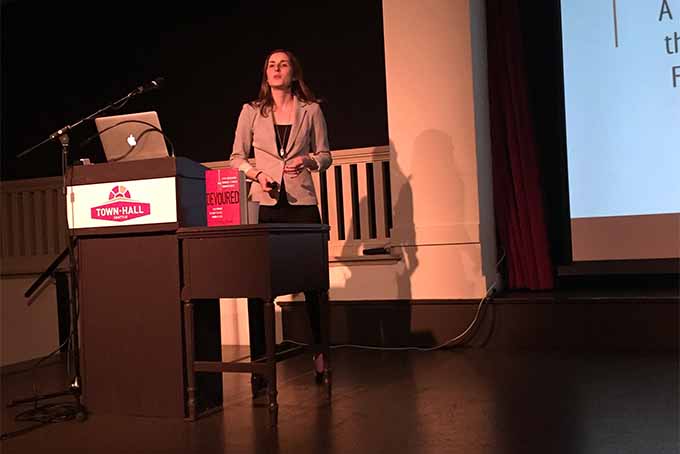
Chicken wings actually are the most popular. And there have been huge news frenzies around chicken wing shortages. There was briefly one about an avocado shortage, which of course relates to guacamole, which again, we actually do eat quite a bit of that on Super Bowl Sunday. So, I really dug into the various marketing tactics that are leveraged during this time of year – February, leading up to the Super Bowl – that, you know, really play on nostalgia, the desire for fun, and to the Super Bowl party and the ways that gorging and bingeing on all kinds of foods really are part of that. And they play on false scarcity in the market place.
Allison: Right. So, we’re talking about this consumer culture that’s driven by incredibly powerful marketing campaigns and, to the point where a lot of people enjoy it as entertainment. They want to watch these ads, and enjoy the buildup, and go shopping for all the food as if, you know, the blizzard of the century is coming and they cannot live unless they have their wings, right? And it’s all about what some people might call a made-up holiday that’s the last pro football game of the season.
So, by the time our listeners get to hear this episode we’ll already know who won the Super Bowl. But I think chances are that for a lot of people this day of gorging will still be on a lot of our minds, right? Because the pounds that we put on on that weekend on top of everything else throughout the whole winter season of holiday feasting is definitely still with us.
Why is it that this has become our own national eating holiday, and why do we like to eat ourselves sick? Why is that part of this very American thing?
Sophie: Yeah, it’s a really fascinating question, one that I was pretty fixated on throughout this chapter. You know, what I learned is that there’s this concept of “foods of privilege,” and this is a term that Rabobank – which is essentially a bank for agribusiness and the food industry, they kind of study trends and so forth – they use the term “foods of privilege” to basically mean the foods out in the marketplace that we don’t hold the same standards to as other foods.
And the main category of those would be holiday-related foods. And that means basically you don’t care if there’s, you know, partially hydrogenated oils in your Easter egg malt balls because they’re something that brings you joy, and they’re a seasonal favorite, and they’re part of celebrating Easter for many of us. We’re not scouring the ingredient lists or we don’t care really about the sourcing, whereas on the everyday foods, they don’t have that luxury.
So, the “foods of privilege” is one part of it. Basically that, you know, it means the Domino’s pizza on Super Bowl Sunday or, again, the chicken wings or the beer or what have you – you’re really not scrutinizing. You know, that is a no-holds-barred event where really, the whole rule book is out the window. And this applies to holidays in general. And what I discovered was that it’s the fact that the Super Bowl has become a national holiday in the United States that we go so hog-wild, if you will, on the eating.
And what I mean is that, you know, in the US, to the point of tradition, one of the things I actually love about the Super Bowl is that we kind of have the freedom in the US to invent a holiday from scratch. You know, this is not rooted in religion or some centuries-long tradition – the Super Bowl has only been around since the ’60s. But it really has this special place in American culture and there is no single mass-audience live television event that compares. You know, the Emmy’s, the Oscars – no other show, nothing. No news event, you know, even like Presidential debates and things like that. Really, the Super Bowl is one of the most universally appealing, one of the most unifying forces in American pop culture. And so it really has become, in essence, a holiday. And so for us, that has its own set of psychological reactions related to food.
So, you really what I discovered is that there is this sort of pattern that’s been dubbed “eating season.” And this is from the NPD group, which is a consumer insights firm, and they’ve observed that really starting around Halloween we ramp up our eating quite a bit. And it’s probably not surprising to anyone that, you know, that picks up through Thanksgiving and through the Christmas and December holidays. But what’s really surprising is that most people think that, you know, January 1st, New Year’s resolutions, everyone hits the gym and starts eating healthy. And that’s actually not the case for most people. The peak week of dieting in America is actually the beginning of March.
I was so fascinated by this, and what two separate sets of researchers have found is that it’s because of the Super Bowl. We really continue that celebratory eating that kind of, you know, has picked up stream through December all the way to the first weekend of February. And the Super Bowl is like the final blowout of eating season. Not only are calories consumed, but, actually, weekly grocery bills peak nationwide in the US on average the week before the Super Bowl.
Allison: There’s another study that was fascinating to me that you referenced, also tied into kind of the psychology, not just of this wintertime comfort nostalgia food holiday, but it was more about being a fan. And for me, I mean, I’ll tell you, I’m an Eagles fan. We have not won a Super Bowl. We definitely at this point still tend to lose more games than we win. And the study that you cite says that I’m likely to eat more calories and saturated fat the next day if my team loses, and I’m also likely to eat less of those if my team wins.
Sophie: [Laughter] Yeah, that was really fascinating. And it sort of makes sense intuitively, right? Like, you drown your sorrows, you sort of say like, “What do I have to live for? I may as well eat this whole bag of chips. If my team has lost, I’m a failure too.”
Allison: There may as well be no tomorrow, yep. [Laughter]
Sophie: Yeah! But it, it is. And I think there’s really powerful emotional associations related to our eating behavior and these big national sporting events, for sure.
Allison: You also talk in your book, again on the topic of nostalgia, which is so important to me when talking about food and thinking about the things I like to eat. It’s not just those things that were made at home, it’s often the branded items, like we said, the ones that you see all the ads for. But on top of that, a lot of times it’s the foods that – it’s not false scarcity, they’ve actually been discontinued. So people will go to great lengths to figure out what they can put together to replicate those things to continue to be able to have them at home and enjoy them. And these can be people who eat healthy foods all year, but then it will be, you know, a certain time and they want those Dunkaroos and they need to know what cookies to buy and what icing to put them with. I want to talk to you a little bit about what you think that’s about. And also you had a quote that you seem to disagree with some scholars, and you seem to think that kids might really be the driving force behind a lot of what we eat. Let’s talk about that a little bit.
Sophie: Sure. So, I know exactly what you’re referring to, and that’s Paul Rozin. He’s a food psychologist at University of Pennsylvania, a very well regarded scholar of food psychology. I put this question to him about what is the deal with these companies sort of bringing back items that they’ve discontinued you, know, Surge was a big one for instance, that like neon green soda drink. And there’s been a whole bunch of others. But they are pretty much unanimously terrible for people. No one’s like, “Now back with our original baby carrots,” you know, that’s not happening.
So, I asked him sort of like, well what’s going on here? Is it something about, that we ate these things as children? And he’s like you know, something to the effect of, “Kids aren’t setting food trends,” you know? “They’re off eating their lunch boxes. It’s adults that set food trends.” And that’s where I disagree because I know, based on other – not from psychology, but from, it’s actually much more almost biological that there’s a lot of research showing that the foods that we eat as children get special status for life. And a lot of food companies know that, and they go to great lengths to cement these associations of their products with your happiest times as children. And happiest times in general, but get brand loyalty throughout a lifetime if you really can kind of get in there early, while they’re, you know, we’re more impressionable.
So, you know, you see this with like birthday party kind of foods. Valentine’s Day is another one where you could think of the exchanging valentines with, you know, your classmates and it’s like, “Oh!” like “I gave Skittles” or “I gave Sweethearts” or whatever. These products, they play on the idea of fun. But actually a great quote from another source I interviewed was Nicholas Fereday, again, from Rabobank, and he said pretty much all of us who observe these tactics know that “fun” is just code for junk food. And so, you know, it’s Pepsi and the pizza at birthday parties. And somehow that becomes ingrained in you as like, that’s what equals celebrating your birthday, is Coke and pizza. Certainty that was my childhood.
So, this happens with the Super Bowl as well – these companies know that if, you know, you as a child have a really great memory of like dunking the Tostitos in the salsa with your dad and your uncle in your living room, like you’re going to buy Tostitos forever, every year when the Super Bowl comes. So this is a very powerful imprint. You know, when we think back to these times of celebration, of gathering with friends and family, of certain special moments in life, they’re almost always associated with – unfortunately – these foods that are absolutely terrible for us, that it’s been by very intentional design on the side of many of these marketing departments.
Allison: For sure. So, you have me thinking a little bit about pizza too, I definitely wanted to bring that into this. On the one hand, I love how you talk about how it’s the perfect food and different things that might be going on there, but also you mention that pizza sales are also really big on Valentine’s Day.
And I thought it was funny because you say, you know, this is mostly because parents need something to feed the babysitter, right? And for me, it’s funny but my husband and I over the past several years, we have sort of developed this tradition of our own.
We don’t have kids, and we stay home on Valentine’s Day and order a pizza on purpose because we know there’s a lot of pressure involved – I’ve worked in restaurants, and between all the people who are out on first dates and the high stress there, and the pressure on the front of the house and the back of the house to get all of these people who might not usually go out for a fancy dinner fed, and it always seems to kind of work out sort of poorly. And to me, instead of it being, “we get to go out and enjoy while the kids and the babysitter at home have the pizza,” it really connected in my mind to what you talk about a lot in the book, which is just that we have these incredibly high-stress lifestyles where we don’t really sit and enjoy. We’re eating by ourselves in front of a screen, or we’re snacking at our desk. So – I know I just covered a bunch of things from the pizza to the not enjoying our eating, but – what can we take away from all of that?
Sophie: Yeah, well first of all, I love that you have that tradition and it’s funny that you say that, because my husband and I actually in the last several years have had this similar tradition where – it was from a pretty scarring restaurant experience on Valentine’s Day where this restaurant had actually put the tables so close together, you know, to get more diners in because it was Valentine’s Day that you were overhearing all the conversations next to you. It was the furthest thing from, you know, comfortable, intimate, you know, pleasant, relaxing, any of that. You knew you were going to pay a million dollars because most Valentine’s Day menus are prix fixe, which is again, probably more than you normally would spend. So I’m with you on the pizza!
And I think that pizza is – you mentioned that I describe how it’s the perfect food. In the US at least, it really is. One of the factors, there are many factors – it’s customizable, it’s relatively inexpensive, it’s relatively fast, it’s greasy and satisfying, so it sort of feels like a meal mentally whereas like, salad for instance doesn’t count in many people’s minds as a meal. But there’s also the comfort food aspect. So, I think sort of spending, you know, a cozy Valentine’s Day with your loved one enjoying that ultimate comfort food really makes a lot of sense.
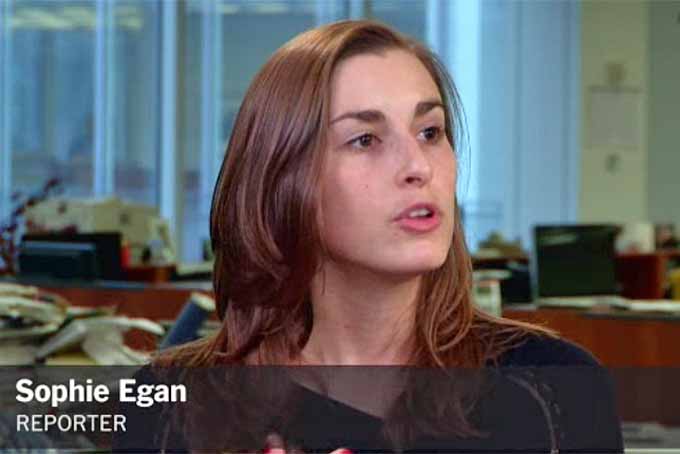
I guess the thing I would offer as far as the takeaway is that we as eaters are complex creatures, and we’re full of contradictions. We want sort of to be free of guilt in our minds for the things that we’re eating, but we feel like we owe ourselves a reward. So we seek indulgence, and we seek sort of clean eating or deprivation in some times. And food is at the center of so much. We mentioned kind of the emotional aspect of your team and sports. There’s the emotional aspect of loved ones and what it means to celebrate something.
But I really think that – I think two things. I think that there has been such a powerful message in that marketing environment that, you know, if you eat something healthy you’re not having fun. And I think that is a paradigm shift that is a long time coming. And I think some sort of forward-looking companies are realizing this opportunity to create new associations with foods that are equally if not more delicious, they just happen to be good for you, and they don’t make you feel like crap afterward. It’s sort of redefining, you know, what does it means to celebrate a colleague’s birthday at work, or if you have a family gathering over, you know, what do you feed them? Those kinds of things.
The other one that I would say is that, to the point of screens and the stress – it’s real. I mean, in my book I focus a lot on the stress that comes from just the sheer pace of daily life.
It’s the fact that as Americans we’re working more than ever before. That applies at all ages – you know, students, middle school students, high school students, college certainly. There’s just a heightened pressure on all of us to be productive, to excel. And the way that we’re tethered to technology makes it ever more difficult to, especially to take breaks to just focus on food and slow down and cook. So, we in the United States not only spend the least amount of time of any of the major developed countries preparing food or cooking, we spend the least amount of time eating food.
So, it is really worth celebrating whatever means allow us to sit and enjoy a meal at a table with people – with other humans. And you know, hopefully that involves gaining some confidence in the kitchen, and preparing some of the meals for ourselves. But really it’s whatever the steps are that we can all incorporate into our lives to regain some more sense of control over the food that we eat, over the value that we place on it as a society in terms of time allocated in a given day.
And the last thing I would just say is that – we talked about the Super Bowl, and that certainty is a timely aspect of my book. But the other one that is less emphasized but ever present is the stress. So, I mentioned that I focus on the work part, but certainly stress comes from all kinds of places. And right now with the tensions in the United States there has actually been a lot of interesting data in the last several months about how junk food is flying off shelves. And people are using food as source of comfort in the past several months in ways that you can see in sheer sales numbers. And that really speaks to a much larger – you know, my book is very positive and upbeat, but unfortunately that aspect of this is a very sobering reality.
Allison: Yeah, and that can mean a lot, especially for people who already are suffering with health issues related to unhealthy eating. You know, there’s so many of us today with various diseases related to obesity and just general malnutrition. Even though we eat a lot – right? – we’re not getting the right things. And as that becomes easier and easier and as our stress eating becomes more of a pressing thing or a thing that we give into – I mean, like you said, to be able to see a change in those numbers just over the course of months, I can only imagine what that might mean in the long term.
I know you said in your book that you didn’t think you’d be running for office anytime soon, but your book came out a little while ago. I wonder if maybe you’ve changed your mind on that a little bit? But we don’t have to dwell on that. [Laughter]
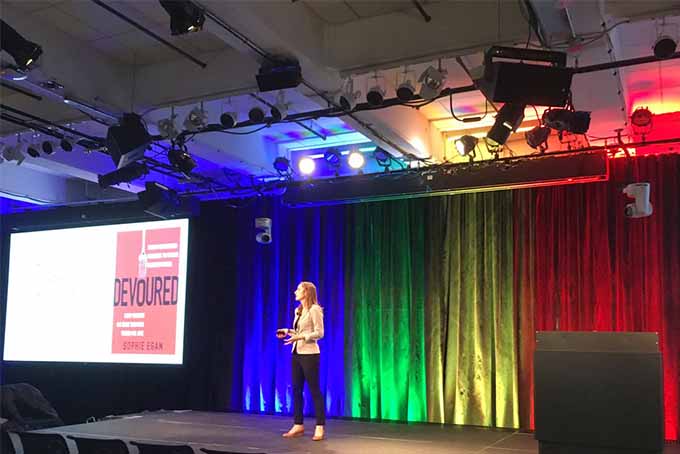
Sophie: Well, I think, I think the one thing that I’ll say on that point is I’m perhaps more sure than ever that I do not wish to be part of the government in any capacity. But what I will say is that I think the quest that I had to lift up what unites us as eaters in America is more relevant now after the election than before, because I think understanding what unites us as anything in America is more worth understanding now than perhaps ever before.
Allison: Yeah, I think that’s a great point to make. You talked a little bit like you just said a couple of topics ago that there are some steps that we can take. And I was kind of surprised. It’s clear from your writing that you love food, but you also mention that you wish you could be a better cook and that you didn’t learn how to cook from a young age. And you thought that was significant, and then had kind of a long-term impact. And you also said that you even think you’re over-reliant on recipes. And I have all kinds of ideas about that.
I mean, for me, I have the opposite story. I grew up with, you know, a chair pushed up against the kitchen counter so that I could reach. Before I knew how to read I was, you know, being taught how to do things in the kitchen. But I am still an obsessive recipe checker, especially if I am baking something – like, you better believe I read a line and then as soon as I look away I’m not sure I know what I read and I go back to it.
So, take it from me, I don’t think over-reliance on recipes has to take away from your cooking. You can always build on that, make a few little parts your own. But what do you think about teaching cooking from a young age, and do we need to do a better job with that for the sake of our future as eaters?
Sophie: Yeah, I do think we do and I included that perspective from myself because while I – I definitely agree that recipes in the context of baking and some other more technical [Laughter] dishes is not something to be ashamed of, I was aiming to just reflect on this intuition that I don’t feel I necessarily have as far as, you know, which flavors go well together, the timing, especially you know, if you’re sauteeing something or if you’re using, you know, ingredients that maybe you haven’t used before, heat, all of that. Sometimes I feel out of my element.
And what I compared it to was, you know, riding a bike or learning a language, where those are things that you just do from muscle memory or just without even really having to concentrate on them. And so I will always be inspired by new recipes I hope, but I think that getting kids into the kitchen, getting them out onto farms or gardens or just touching food, understanding what is a seed, how is it grown, what’s in season when. You know, having conversations with them at the grocery store of why we aren’t going to buy blueberries in January or why certain foods may not even be in the store at certain times of year. Those kinds of things I think just create a level of food literacy in the US that is much needed.
Often I hear lots of people – as there has been a heightened interest in food – I hear tons and tons of people say that we have a broken food system. And I wholeheartedly agree. But we also, I think, have to have a better understanding of food itself, as citizens basically, to really contribute meaningfully and thoughtfully to what the better ways could be. It’s, to me, this great opportunity to really bring food into the classroom. One of the things that I find from my professional work is how much the dining spaces in schools are really considered this sort of – pit stops. Kids have like ten minutes to shovel down something barely defined as food.
Allison: And it might be at ten o’clock in the morning, right?
Sophie: Right! Whenever they squeeze it in to the schedule. It was likely not prepared by someone with any culinary training. It was likely not scratch cooking. Most of these school districts have incredible budget constraints. But also, you know, the people who feed kids are not considered part of the educational team. And I just think there’s a real opportunity to bring curriculum into the dining space, you know, with chefs there to kind of help with some of that food literacy, but also, into the classroom. What does everyone have as snacks today? Let’s talk about that.
There is a – long overdue, I would say – integration and recognition that goes to a much higher level, a recognition of the importance of food as a society. Because we send this message, I think, from a very young age, that food is just the fuel to get us through the day. And so then you have college kids who – you know, I work with a lot of food service directors at campuses. They can’t keep up with the demand for grab and go. Where do you think we got that? We got that because we were trained as kids that you have more important things to focus on. Then you have the adults who are dining at their desks. I mean, this is a lifelong set of habits.
And so that’s where I just really think that, in terms of gaining really an ease in the kitchen as far as how to feed yourself. Also really contributing to that better food system through food choices and food purchases that we all make. And also through, sort of at that policy level, through the amount of time that we give people to, at – all through these ages – to learn about and just really focus on real, good food.
Allison: And I think it’s really important too, like to me that idea of the college food and grab and go – for me it was also being so surprised when I saw how many people I went to school with were eating chicken fingers and fries every day not just because it was quick, but because they were really afraid to try anything else. And you say this is a uniquely American value, and your quote is, “As a people, we are curious, open to the new – the unknown or lesser known. We care about discovery” [p. 308]. But then you go on to say that at the same time, we have these old standbys like burgers and french fries and things like that, that have also become more popular alongside these foods from all different cultures. So people want a little bit of the new and the exotic, just enough to be comfortable, right beside more of the same just in case it doesn’t work out, right? So is that this uniquely American thing?
Sophie: There’s at least two things going on there. The uniquely American aspect that I am identifying is this incredible open-mindedness. And it comes back to the not being really restrained, if you will, by having to follow custom, or having to adhere to sort of the replication of authentic traditions. It leaves us free to adopt new habits. For many people that means jumping on new fad diet bandwagons. But it also means we can fold in the cuisines of all kinds of different people in the United States in, you know, really a true melting pot kind of cuisine. And it means that, for the most part, that hunger for novelty, that appreciation of innovation, it makes us – again, generalizing – open to trying things. But it is true that it’s within certain boundaries.
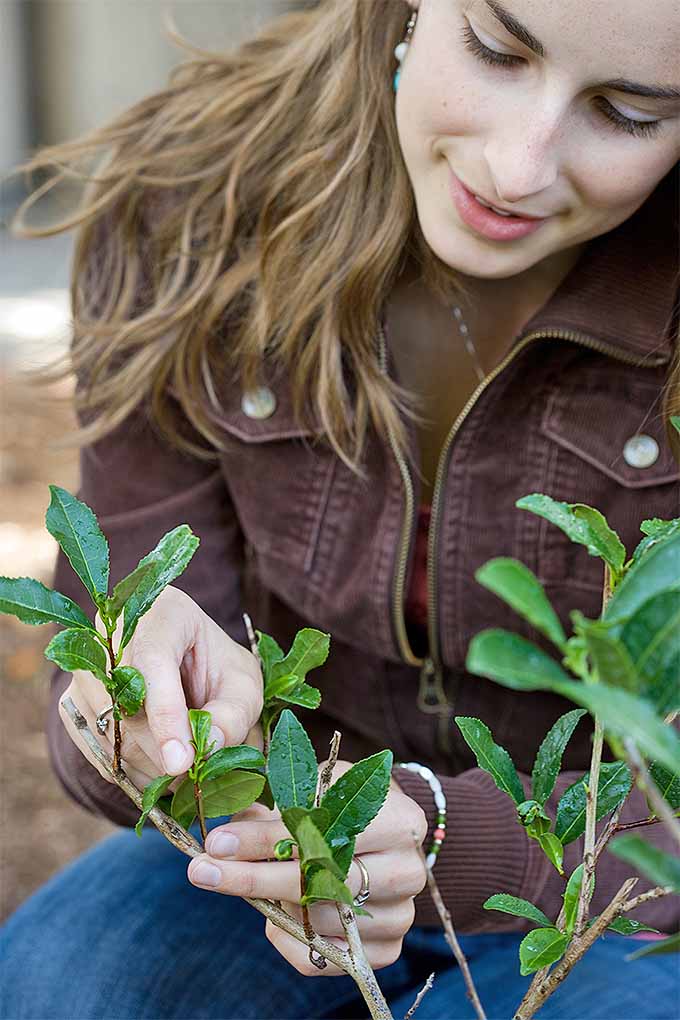
So a lot of these boundaries have been stretched, I would say, because of things like food trucks and fast casual places where the risk of stepping a little bit further across that line has been mitigated. You don’t have to go, you know, have a whole evening at a restaurant to try Korean food for the first time in your life, you know? You can maybe spare one lunch, a weekday lunch, if there’s a food truck parked outside your office.
Allison: And you also don’t have to risk maybe buying all those ingredients, taking them home, maybe burning something and ruining it all… Yeah.
Sophie: Right. And I also – the other one that I think has helped with this a little bit, in an interesting sort of byproduct, has been meal kits.
So Blue Apron, those kinds of meal kit companies will often include ingredients that most people wouldn’t know where to find, they wouldn’t know how to pronounce. And again, because it kind of comes pre-portioned for you, they often will have a card that sort of explains what it is. All of these ways are sort of stretching those boundaries like I mentioned. But, it’s the, the whole point I mentioned before of this bizarre set of contradictions that really characterizes us as a people where, again, we seek the new or we seek the novel, but it’s within the familiar.
So, naan (N-A-A-N) pizza is something that people would try because it’s within the pizza construct, right? [Laughter] And there’s countless examples of that. You know, Korean tacos – well, we all like tacos, so sure, I’ll try a Korean version of that. Or, it’s really a fusion version.
I’m excited by the expansion of our palates, and the flip side of that instability of our foodways is that it leaves us open to creating as a collective, creating all kinds of novel food experiences and types of hybrid cuisines. And it also allows us to really explore different cultures within the United States through food. So I, especially again in today’s current climate, I think that food as a pathway to common ground with – you know, whether it’s refugee communities or just all kinds of immigrant populations, is a pretty exciting pathway.
There was a really beautiful New York Times article [Editor’s Note: this story was reprinted on NPR’s blog the salt, and it originally appeared on WNYC.] recently about, actually Syrian refugees who will kind of come to your house and cook you a meal. And it’s the opening to a conversation. So I’m excited by the sort of trendline that we are getting ever more daring and open to new foods.
Allison: Yeah, definitely. Some hope for what might come in the future.
So, did doing the research for this book change the way that you cook or that you eat at all?
Sophie: [Laughter] That’s a great question. I, in general, have been very aware of false health claims on food products. I have been reading nutrition labels and sort of up on a lot of that for quite a long time. But it made me an ever more detailed scrutinizer of food labels. So I would say that if anything, it takes me longer to get through the grocery store having done all this research than it used to.
It made me not – this might sound like a copout, but it made me not feel as bad for when I eat the kale salad for lunch and then decide to treat myself to a chocolate chip cookie, you know, right after. For being what at times I felt like was a hypocrite or just sort of you know, how do I kind of explain this? And it just made me feel like sort of okay, or more comfortable in my skin I guess as an eater, that there’s a lot going on here.
And it’s never as easy as it sounds just to follow the, you know, everything in moderation, or to sort of always stick to your aspirational eating habits. And that the discovery and indulgence are all part of it. They’re part of this grand experience of being an eater – of course, within certain limits! But I think I long have had a lot of pressure on myself as, you know, to be a healthy eater. And frankly, I enjoy – the foods that I tend to find most delicious just happen to be healthy. But I understand now – whether it’s the marketing lovers or the food science in terms of the brain chemistry that’s going on when I’m attracted to certain foods that aren’t as good for me – I understand that for all of us, it is a very difficult food environment to navigate. And we’re all just doing the best that we can.
Allison: I am right there with you, and I’m sure just about everybody would have to be. I know for me, having read a lot about food in my research in school and my writing now, like sometimes it seems like the more you know, the more guilty you feel when you don’t necessarily make that healthy choice. And I mean, I moved to Los Angeles from Philadelphia by way of Boston a few years ago. And you know, I thought I ate healthily. But here, sometimes it really makes you feel like everyone is getting up and making a green juice and going on a five mile hike every morning, you know? And I still like a cheesesteak once in awhile. [Laughter] So, I’ll always be that person. But it really is okay, and I think it does make a lot of sense to, at least once in awhile, make sure you do indulge and really eat something you enjoy, whether that’s kale or whether it’s, you know, a Doritos Locos Taco [Laughter] like you also talk about.
Sophie: I’m right there with you as well, and I think that the hope is that this book can give us all this bird’s eye perspective on ourselves. And that sort of armed with the awareness that readers can gain from reading Devoured, we can at least be making those choices intentionally, and we can feel that we’re in the driver’s seat more. And, you know, at least that when it is the indulgence or the special item, we’re doing it because we chose to and not because we felt forced into it by a sort of limited time only offer, or you know, some other sorts of mindless eating throughout the day in the office kitchen, but that really we’re making those decisions with intention.
Allison: So, a few fun questions to wrap it up. What’s the most exciting new food that you’ve tried recently?
Sophie: Don’t know the name of the company, but there is this snack that’s broad beans.
Allison: I’ve seen this, yeah.
(Editor’s note: these are Enlightened Bada Bean Bada Boom Roasted Broad Beans, available on Amazon.)
Sophie: They’re mesquite flavored, and they are delicious. They’re crunchy like a chip, but they’re plant protein, so fiber and fill you up, and the taste is just phenomenal.
Allison: Awesome. My instinct now of course is to figure out if I can engineer them to make them myself at home. So I will be researching that as soon as I am done talking to you. It’s worth a shot. I’ve gotten Cheez-Its down pretty well.
Next, what’s a comforting nostalgic food that you enjoyed recently?
Sophie: Like many millennials, breakfast cereal is a comforting, nostalgic food for me. And I was visiting my parents’ home in Seattle a couple weeks back and they had some Golden Grahams. [Laughter] I was staring at the pantry like, “I don’t eat Golden Grahams. Why do I really want a bowl of Golden Grahams?” But it really hit the spot.
Allison: You were drawn to them. There’s a beacon! Definitely. Oh, I can relate to that. Again, for me in college too, if I made that lap around the dining hall and there was nothing to eat, I would get the sugariest cereal I could find and put ice cream on top of it, and that was my college go-to dinner. And I can’t say in the years since then that I have never done that from my own kitchen at home. So, you eat what you love, at least sometimes.
So, thank you so much for talking to me today. This has been great. I don’t think we gave away too much – there’s so much more to get out of your book, so I really hope people will run out and get it. And I know that eventually this summer it will be released in paperback, so that’ll make some excellent beach reading, in my opinion.
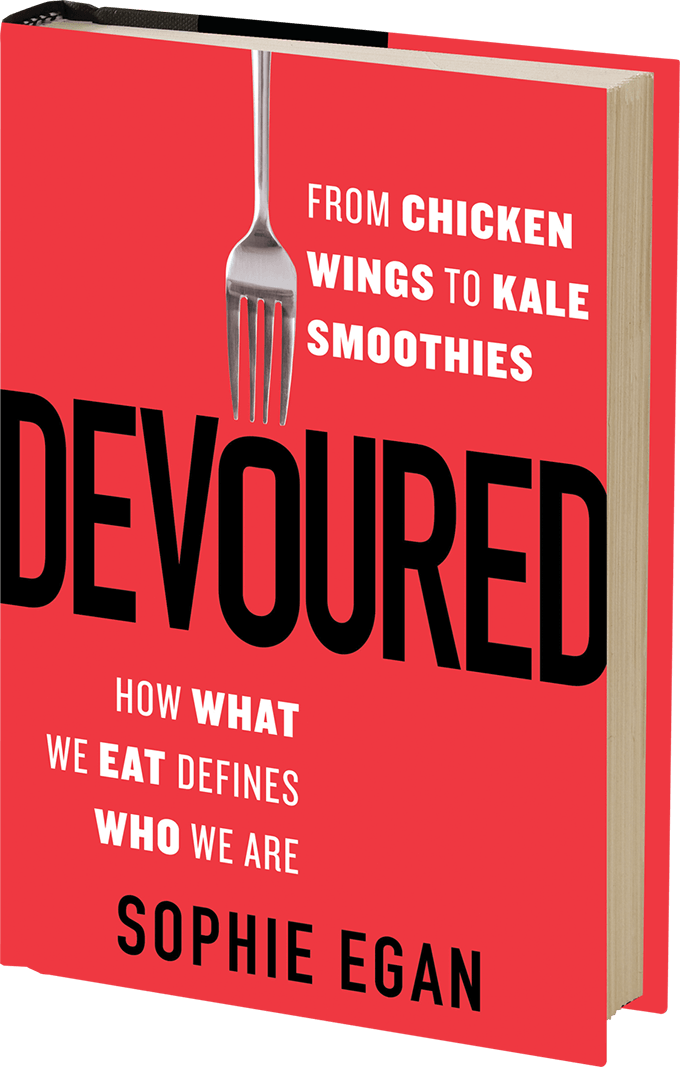
I know, if you want to touch on these real quick, you also have a four-part series going on right now that’s on food and work in the magazine Edible San Francisco. Do you want to talk about that a little bit and tell us how listeners might be able to find it?
Sophie: Yes, definitely. It just actually was released online this week so it’s available now, Edible SF. And the first one is “Food at Work” and it’s all about the marriage of coding and culinary in the San Francisco tech scene. And I’ll be fleshing out the different ways we skip breakfast during the week and reward ourselves with weekend brunch, and all the in between as far as our working habits and how that affects our food choices, over the next year. So stay tuned for the rest of the series as well.
Allison: Mm-hmm. Awesome. And I know you told me you’re also going to be talking about international food trends at the upcoming IACP conference – that’s the International Association of Culinary Professionals – and whether these trends, I guess, happen globally or if they all start in North America.
Sophie: Yes, looking forward to that panel discussion. For anyone who’s going to be at that conference, that’s in the first weekend of March in Louisville, Kentucky, which I’m very excited about. And I’ll be with some great fellow panelists including a consumer insights expert, actually one of the people from my book, Melissa Abbott, who is kind of food habit expert from the Hartman Group based in Seattle, Washington.
Allison: Great, and where can readers find you online? Are you on social media? Do you have a website?
Sophie: Yes. My website is sophieegan.com. You can follow me on Twitter and Facebook at SophieEganM, and the best way to find my book is whatever way you prefer. So, there’s all the major book sellers online, or your favorite local bookstore should have it. And the paperback, as mentioned, will be out on July 25th.
Allison: Fantastic, and there will be a link to that to get it through the Amazon.com website. Thank you so much for talking to me today Sophie, it’s been great.
Sophie: It was my pleasure. Thank you so much, Allison.
A Uniquely American Style of Eating
Did you like what you heard? Please subscribe on iTunes or wherever you find your podcasts, and leave us a five-star review. We’ll be back in about a month with the next episode!
What would you like the Foodal Podcast to explore? We want to hear from you – let us know in the comments!
Interested in sponsoring the podcast? Let’s talk!
Photos provided by Sophie Egan.
About Allison Sidhu
Allison M. Sidhu is a culinary enthusiast from southeastern Pennsylvania who has returned to Philly after a seven-year sojourn to sunny LA. She loves exploring the local restaurant and bar scene with her best buds. She holds a BA in English literature from Swarthmore College and an MA in gastronomy from Boston University. When she’s not in the kitchen whipping up something tasty (or listening to the latest food podcasts while she does the dishes!) you’ll probably find Allison tapping away at her keyboard, chilling in the garden, curled up with a good book (or ready to dominate with controller in hand in front of the latest video game) on the couch, or devouring a dollar dog and crab fries at the Phillies game.

